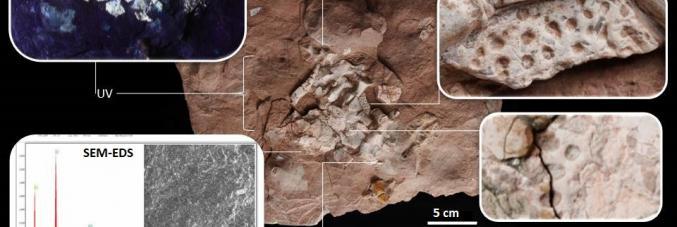
Even large predators found saltwater crocodiles tough to digest
13.12.2022
A new finding from studying the fossil remains of a marine reptile that lived 150 million years ago housed in the Museum of Geology and Palaeontology of the University of Padua. The remains studied by geologists Giovanni Serafini (University of Modena and Reggio Emilie-UNIMORE) and Luca Giusberti (University of Padua) found that large predators could not fully digest marine crocodiles (teleosauroidae) of the Upper Jurassic.
The geologist Danilo Giordano found the fossil in a gorge located in the Belluno Province in 1980. What he uncovered were the skeletal remains of a small teleosauroid reptile (a group of marine animals similar to crocodiles) in a slab of Rosso Ammonitico Veronese. Although the fossil had been exhibited for many years at the Museum of Geology and Paleontology of the University of Padua, scientists only recently noted that the remains held several unusual characteristics. In 2021, geologists reviewed the sample once more, noting that the small vertebrae, pelvic elements, and displaced osteoderms (bone found in most reptiles) had been regurgitated; forming a pattern of remains superimposed on each other over a single mass that is highly unlikely to be the result of physical processes in the environment during fossilization. This particular fossilization occurred in a deep seabed not affected by currents, making it much more plausible that the biological origin is closer to a gastric pellet resulting in a mass of skeletal remains passed through the alimentary canal of another animal.
Geochemical and microstructural analyzes conducted under the electron microscope on samples of matrix and bone extracted from the specimen confirm this hypothesis. The study notes that the microscopic corrosion of skeletal tissue, while the sediment records low levels of phosphorus lost from the bone. These particular characteristics indicate a rapid and limited attack by gastric acids, identifying the remains as a regurgitalite, a mass regurgitated by a predator or a scavenger.
This fossil represents the first recorded Teleosauroidea found in a regurgitalite.
The finding is therefore of great interest, as it documents an extremely rare trophic interaction in a marine environment. The predator that may have fed on the small teleosauroidae and then regurgitated it is not easily identifiable; perhaps a shark, pliosaurs, ichthyosaurs or another category of marine crocodile found in Jurassic seas known as metriorhynchids.



